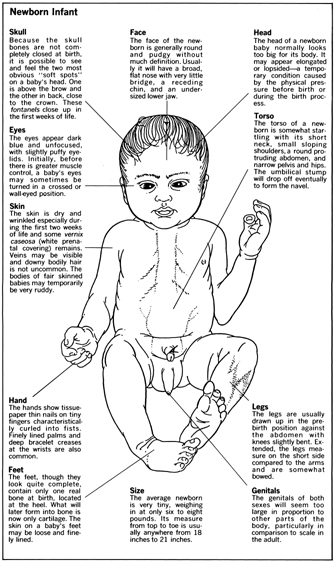Birth, Infancy, and Maturation - Some advice to new parents
Now that you are new parents, you may find that anyone—from your mother-in-law to the neighbor down the street to strangers in the grocery store—will be giving you advice on how to be a parent. This is usually because people realize you have entered what can be a most frightening, challenging, exciting, and periodically overwhelming new world, and they only want to help you. Becoming a new parent is a special occasion that can bring with it a rush of conflicting emotions and demands. Even for the parents who are prepared to change their familiar routines, this can be a stressful as well as happy time. Either parent, for example, may feel jealous of the new little person who is receiving so much attention and affection from the other parent. Both new parents are often tired physically and mentally. Relatives and friends may infringe on the new parents’ privacy and interfere with their decision making. And, the new mother may find it hard to reconcile her maternal instinct with her desires as a woman and wife.

To adjust to this different phase of life, new parents may want to consider the following:
- • The new baby is a shared responsibility. Neither parent should be excluded from the experience of parenthood. New fathers and mothers should learn to feed the baby, change diapers, hold the baby, and get to know him. Parents should take time to assure one another that they are just as important to each other as they were before the child was born.
- • Arrange for some kind of assistance at home and don't wait until the baby comes back from the hospital to do it. Plan ahead. New parents are often physically and emotionally tired after the birth experience. During the hospital stay the baby was cared for by a trained staff, but once the family comes home, new parents can feel overwhelmed by old and new responsibilities. A relative, friend, housekeeper, or other trained person can stay with you to help out with chores, such as shopping and cooking, to allow you time to adjust to your new life.
- • Arrange to have a separate area for the baby even if your home is too small to allow for a nursery. A distinct area or bedroom should be chosen for a crib, a changing table, and a dresser that holds the supplies you will need when changing, dressing, or bathing the baby. Organization will make life easier for both you and the baby.
- • If the baby fidgets and fusses at times, try not to get anxious. If the baby has been fed and is dry and safe, then relax. New parents may be anxious around their baby, and the baby will be sensitive to emotional responses, especially when being held. Realize that your own occasional feelings of uncertainty are normal, just as it is normal for any baby to periodically fuss.
- • It is important for you, as new parents, to be the ones to determine when visitors are allowed over, how long they will stay, and how much the baby may be handled. A new baby should not be subjected to excessive stimulation, and as you get to know your child, you will sense when he is becoming overwhelmed by activity and attention. A baby needs a quiet, organized home, free from the kind of upsetting distraction that may come from being startled by loud noises, surrounded by numerous people, and held by many unfamiliar friends or relatives.

Comment about this article, ask questions, or add new information about this topic: